#read a book titled
Explore tagged Tumblr posts
Text
At this point, any book I read makes me think of Usopp. And this time it results in another Water 7 point I want to make

I understand that One Piece is a shonen series, so certain themes are expected. But when I reflect on Usopp's struggles during Water 7, it bothers me how people still defend Zoro’s words as if they were absolute. Zoro’s beliefs weren’t entirely safe or right. Water 7 touched heavily on themes of manhood, which many Usopp fans have pointed out, especially regarding his relationship with Franky. But when you dig deeper, Usopp deserves more grace and consideration.
Despite what Sanji and Franky did for him, it wasn’t enough. Usopp didn’t have a father figure to help him build the self-confidence every boy—or anyone—needs. Sons often get their self-confidence from their fathers, and without that, Usopp was left to suppress his emotions and internalize his pain. So when people in the fandom argue that Usopp was wrong and shouldn’t have let his “pride” get in the way, it feels unfair. It goes back to the issue of suppressed emotions, which is incredibly damaging without a positive outlet—a skill Usopp was never taught or able to explore.
I also think Usopp might’ve learned the wrong lesson from Water 7, especially when the fandom considers what was “right” as actually being morally wrong. I came across someone’s interpretation of Usopp’s fight with Luffy, and while I didn’t agree with most of their negativity, I did see their point about the “might is always right” mentality that Zoro seemed to push. This mentality, according to the commenter, stripped Usopp of the little confidence he had left by Water 7, along with the autonomy and moral compass that were truly his own, even if they were chaotic and unconventional.
So it really bothers me when people view Usopp’s stance as disloyalty. In reality, it showed that he wasn’t willing to blindly follow others—he believed everyone deserved an explanation, including himself. In that light, Usopp’s apology after Enies Lobby feels underserved because it doesn’t validate the struggles he went through or extend beyond the surface-level support he received before.
read more: what was the point of this post?
#read a book titled#I wish my dad#by romal tune#one piece#usopp#op usopp#one piece usopp#god usopp#usopp one piece#sniper king usopp#straw hat usopp#sniper king#captain usopp#water 7#water seven#luffy vs usopp#usopp vs luffy#enies lobby#analysis#character analysis#op meta#roronoa zoro#shonen#one piece manga#manga#anime#wesleysniperking
38 notes
·
View notes
Text
Babylon and the Duck of Butter
I have a gift for falling in love with random objects. One time, my aunt got me a little rubber chicken, and whenever I squoze it, a little egg thing popped out. Very silly. Except that chicken became something like my best friend. I carried it with me to school, and I kept it with me in my pocket, and whatever social hazards there were about Being The Guy Who Got Stressed Whenever His Rubber Chicken Was Missing were far outweighed by being The Guy Who ALWAYS Had a Rubber Chicken On Him. There's a lot of comedic opportunity that comes with always having a good prop on your person.
Of course, the chicken did eventually. Explode. And such was my grief that I did not eat for 36 hours. This was very stressful for many people. Mostly my mom. I was a very strange child to work with. She took parenting so incredibly seriously, and then I'd pitch her these curve balls like refusing to eat for a day and a half because my rubber chicken died. No parenting book tells you what to do when that happens. You just have to feel it in your heart.
A less tragic story of an object that I fell in love with was a large, foam toad that I found in a trinket shop. The toad was the size of a very large grapefruit. Much too large to carry with me to school (thank god) but enough that I could move it around the house, to keep me company during my solitary pursuits. If I was reading, the toad was there, and if I was tinkering with legos, the toad was there, and even when I slept, I would wrap the toad up in layers and layers of blankets, and then spoon it. I did this until the rubber coating on the foam started to wear out, and the foam started to get brittle and break down and leak this repulsive yellow powder. Then I simply put the toad in the playroom and would consult it on matters of great importance. Eventually I stopped doing that, and someone took the opportunity to dispose of it. Not sure who. By the time I noticed its absence, too much time had passed for me to actually be sad. As an adult, part of me thinks I would have maybe liked burying the toad, but part of me also thinks I might have refused to part with the toad, which would have resulted in it leaking more repulsive yellow powder into the house. So I understand why that decision was made.
I want to state that this does not happen often, and it does not happen on purpose. I don't choose to fall in love with random objects. And it's always a little bit embarrassing when it happens.
Which brings me to my wife.
Before meeting my wife, I did not often go to places with crowds. I didn't really think of it as avoiding them - those places just didn't seem fun to me. But she liked those places, and I really liked her, and being with someone who really likes something can kind of sell you on liking it too, so I'd take her to places and watch her Visibly Enjoy the Fair and go: Alright. The fair is pretty sweet.
Which is a thing that happened. After fourish months of dating, I took her to the fair. And she fell very visibly in love with a large series of quilts, and she stayed near them for a while, which she thought was very embarrassing, and I got to pretend to be understanding as an outsider, because I thought it would be much more impressive than also being the type of person that would fall in love with a quilt.
Do not do this. The gods punishment for my hubris was that the room next to the quilts was full of butter sculptures, which was an entirely new thing to me, and I immediately fell embarrassingly in love with all of them. It was like the biggest, sappiest non-sexual crush you've ever had, but not only did the other person not recipropcate, they could not, because they were made of butter. I actually got yelled at for pressing my face against the glass, which is fair, but also, I hadn't realized I was pressing my face on the glass, I just started leaning forward because after approximately 30 minutes of staring wistfully at a cow made of butter my legs got tired. And I think I should be given some grace for that.
Anyway. My wife was very patient with me taking more time to look at the butter sculptures than the average person might spent at the Louvre, and she also felt much less embarrassed over falling in love with a quilt, and we had a good laugh about it on the ferris wheel.
A few weeks after that was my birthday. And I don't know what I expected, exactly - but I did not expect what she did.
Dear reader, she made me a butter sculpture. Of a duck.
She picked a duck, because our first kiss was at a Japanese friendship garden. It was our second date, and she'd made up her mind not to do any kissing until the third date, but as we sat on the grass, a duck walked past me, and I'd just seen the hold-duck-gentle-like-hamgurber meme,

so I sort of impulsively reached out and snatched it. I honestly didn't think it would work. I don't know who was more flabbergasted, me or the duck. But we looked at each other, and then I looked at her, and then she looked at the duck, and she looked so incredibly envious that I assumed that must have wanted the duck so I just handed it to her.
It turned out she was actually envious of the ability to just grab a duck as it walked by, but she accepted the duck and stroked it a few times before releasing it. (She also made up her mind to kiss me in that moment, which was very nice.)
Anyway.
She made me a butter duck of my own. Obviously, I fell in love with it immediately. I cleared out all of the freezer-portion of my mini fridge, and I put the duck in there, and for the next several months, when I felt sad, or lonely, I would open the door up and spent some quality time. Just me and my duck.
But this is, of course, not the end of the story.
Because.
After several months.
The mini fridge died.
I really didn't use it that often. It was mostly my duck storage container. But one day, I walked by it, and it struck me that it wasn't humming. So I opened the door, and it was just. Far, far too late. The duck was dead. Dead dead. Turned into a foul-smelling slime dead.
I cried. I did. After the rubber chicken thing, I thought I had changed, but I had not changed, and the unexpected death of my butter buddy left me pretty shook. I texted my then-girlfriend now-wife about how sad I was, and she actually came over to help me say goodbye. We didn't even bother scraping the duck out of the mini-fridge, we just said our goodbyes to both and threw them together in the nice dumpster behind the chapel, because it seemed appropriate to put it in God's dumpster. And it did actually help quite a bit. I certainly did not go 36 hours without eating again.
And that was, for some time, the end of the butter duck.
However. Three (or four?) years ago, for my birthday, my wife was looking around thrift stores. And she found something interesting.
The original butter duck had an odd pose. She'd sculpted it laying flat, intending to raise it up later. But the butter was less flexible than she thought, and she was afraid of cracking it so she left it down which left the duck with a very elongated, very in-motion appearance. And she found a brass statue of a duck in the same, running posture.
It wasn't the original. But it was oddly on the nose. It was a yellow brass, it had the same strange posture, the same crude little face feathers.
I think it was $3, but it remains perhaps the most thoughtful gift I have ever received. I got very choked up when I unwrapped Butter Duck, The UnDying.
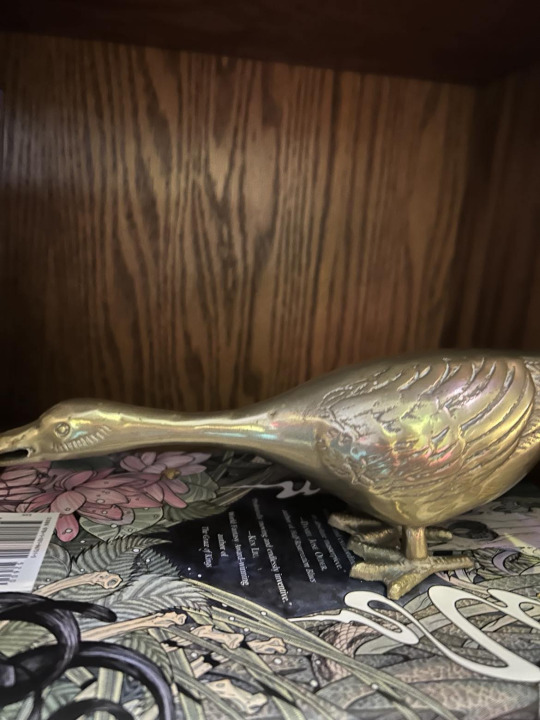
Pic provided.
#Babylon-Lore#There was a Reddit ask about the most romantic thing your partner has done#and this story stuck out to me#It's one single silly object that encompasses a lot of relationship milestones with us#title is a weird reference to Crispin and Cross of Lead#For absolutely no thematic reasons I just really like that title#Remember it as a good book but it has been like#20 years since I read it
2K notes
·
View notes
Text
I handle a lot of books every day, and I have learned that cozy mystery novels (which the grandmas go NUTS over) always have some sort of cute animal or whimsical handicraft on the cover, but since they're mysteries, there's usually still some form of grisly murder involved, which gets you absolute gems like this:
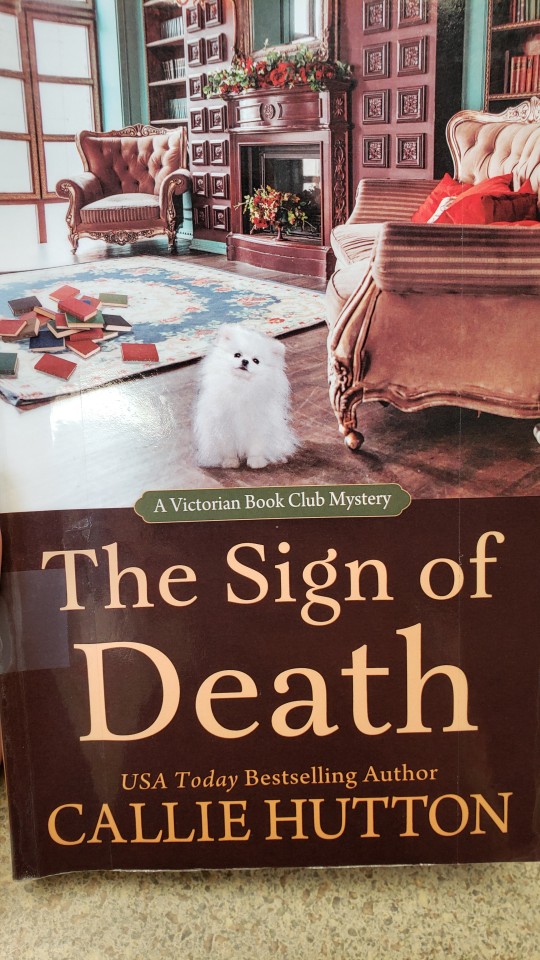
#ragsycon exclusive#i don't know shit about the quality of the novels. I've never read em#i just love pulling a book off my cart with a baby kitty in a teacup on it & i check the title & it says some shit like DEATHSTABBER SUPREME
8K notes
·
View notes
Text
Ideology of Exceptionalism and Gravity Falls; meta and character analysis

I had a whole ago read a post by @icanlife that had a quote by Alex Hirsch on Ford's greatest flaw, and wanted to explore what the flaw is, which is the ideology of exceptionalism; in the exploration, I’ll touch on what it is and how it is used in abusive relationships and cults, as well as how it drives multiple Gravity Falls characters and consequently how it impacts relationships between these characters, and how the show ultimately refutes exceptionalism.
Quick note here; I am not in any way, shape or form a psychologist nor have any formal training in psychology; this is written from my own experiences with this ideology and my own forays into psychology and trauma-informed learning. It is also written with a loose understanding that is likely not broad enough to cover all references to cults, extremist groups and abusive relationships.
The Ideology of Exceptionalism
First of all, we have to get through a drier bit, which is… what is the ideology of exceptionalism and how does it arise? Might be fairly obvious, but it is the belief that you are, or belong to, a group of exceptional people, thus more important and worth more than anyone else; ie, those who don't qualify as 'exceptional'. It is often a subconsciously learned ideology. Now, what qualifies one as exceptional can be extremely varied; generally it revolves around something that provides some form of privilege. Thus, it might be, as the main exceptionalist idea in Gravity Falls, 'intelligence', or power, or it can be such things as attractiveness, quantity of money one has, species, nationality, or skin colour and ancestral heritage. The ideology of exceptionalism, being by nature hierarchical, devalues, and at its worst, openly and violently dehumanizes those who do not qualify as exceptional.
For why exceptionalism occurs is an extremely broad topic, but I've personally found that, for exceptionalism revolving around intelligence, it's a result of a poor sense of self-worth, and having one's self-worth tied to what makes one exceptional. Poor self-worth itself (again, broadly) is a result of childhood trauma from a lack of positive affirmation and unfulfillment of the emotional needs of the child. Meanwhile, self-worth becoming tied to the quality of exceptionalism generally is a result of when positive affirmation was pretty much solely provided around their 'exceptionalism', especially when provided derogatory commentary, or a blatant example of how they would be treated if they aren't 'exceptional'. As a result of the general lack of affirmation, self-worth then becomes often solely reliant on the qualities of exceptionalism, as that is the only way for the child (and later, adult) to get affirmation of their worth, as well as out of fear of being ‘not worth anything’ like the examples of ‘non-exceptional’ people they have been given.
This is especially likely to occur when the child is a social outcast; the adoption of the hierarchical ideology of exceptionalism, and the devaluation/dehumanization of others often occurs subconsciously as an avoidance/minimization tactic from pain. This is to say, the child, and later the adult (if healthy self-worth is not established) goes 'it doesn't matter what the non-exceptional people say or if they accept me since I matter more than them because of my exceptionality'. It can even be taken further, that being shunned is part of one's exceptionalism, and becomes part of the qualifier of being exceptional. For instance, 'they just can't understand because they aren't exceptional and that's just a part of being exceptional'. This idea also neatly tailors into the part of the concept of being better then others means you are separate from others; this can be taken that someone who is special, needs to be alone to be truly special.
Obviously, exceptionalism is not a healthy coping mechanism for poor self-worth, as often such people constantly feel the need to prove and show off their exceptionalism to gain that affirmation and avoid rejection, which is stressful. As well, it often negatively impacts their relationships with other people as a result of the arrogance of believing that they are better than most others, or even deliberate sabotage due to their arrogance. This occurs as they flatten the complexity of human experience to black-and-white hierarchical categories of exceptional/not-exceptional through constant judgement of those they meet, and often refuse to engage with people who don't belong to their 'exceptionality', or even people they simply don't like, even if they technically qualify. Generally, those that they do like or have close relationships with, often due to being similar, are automatically labelled as 'exceptional'. Those judged as ‘exceptional’ also become privy to the open judgements of ‘non-exceptional’ others, out of a subconscious belief by the exceptionalist that the other believes similarly; something that may strain their relationship if the other doesn’t ascribe to exceptionalism. This all culminates in the exceptionalist being blind or even adverse to the diversity of experiences, which makes it difficult to create relationships and community outside of echo chambers of their own beliefs (if they can even find this), and subsequently, these people are often isolated and have very few to no close relationships with people.
However, all humans require connections with other people, relationships where one can rely on others emotionally and physically if needed and feel accepted; they also require to feel like they are worth something, that their life has meaning. Lacking meaningful connections and having a crippled sense of self-worth, a deep yearning hole is left in these people. Exceptionalism, especially as it is a narrative constantly pushed by Western society as it validates hierarchies, is then employed as a (often subconscious) trauma response to assuage this yearning hole, with arrogance and denial. And depending on the circumstances, it can be a very strong and definitive trauma response for people.
This isolation and lack of self-worth is catnip to abusive relationships, including cults and extremist groups. These types of relationships often heavily rely on isolating their victims or pulling them into echo chambers of solely the abuser’s rhetoric, to redefine what is healthy through gaslighting; as the exceptionalists are already isolated, this makes them extremely susceptible. They also often provide these people affirmation, and in these cases especially about their exceptionalism, thus confirming their self-worth, their 'specialness', while also providing them the connection they have been lacking, either through the cult community or through the abuser’s own presence. These emotional needs, which haven’t been met in a long time, if ever, begin to be fulfilled; something that abusive relationships and cults hinge on, rather than any form of logic.
Ideology of Exceptionalism and Gravity Falls
The main characters within Gravity Falls which are heavily ascribed to exceptionalism would be both Ford and Bill; this characterization deeply impacts the story and their relationships with others (technically the Northwest are another case regarding wealth, but less directly impact the storyline and thus tangential; Gideon also is an example, but as a mirror of Bill). With each of these characters I’ll go into detail within their sections on the way they began to ascribe to exceptionalism, and how it plays out later in their relationships; I will first begin with Ford, then move to Bill. Then, to cap it off, I’ll go into the characterization of Stan and the way Gravity Falls refutes exceptionalism.
Ford and Exceptionalism
Firstly, the quote from Alex Hirsch that kicked this whole baby off, as mentioned previously;
“Ford sees Dipper as someone who’s special like himself. That’s Ford’s great flaw, his arrogance is he believes that there’s special people, and everyone else. That human attachments are actually weaknesses. And the song and dance that he’s giving Dipper right now, is the song and dance that he gave McGucket, back when they were younger… ‘You and me are different, we’re better than everyone else. We have a path that no one else can understand, and only us can do this.’ It’s a very seductive idea for Dipper… Dipper is a smart kid, but Ford’s projecting. Ford loves Dipper because he sees someone who’ll tell him ‘yes’ to everything. Who’ll never challenge him, who’ll do a really insane dangerous mission.”
Very blatantly Alex Hirsch calls Ford out on his arrogance in the belief that he is special, in his belief in the 'lone hero' complex, in his belief in exceptionalism. And really, it should be no surprise that Ford does so, considering the way he's depicted as a social outcast as a child (other than Stan), and the way his parents have been clearly shown to be not particularly emotionally supportive (“I’m not impressed”); they don't provide positive affirmation except for his intelligence (mostly due to the possibility of money making through it…), while also actively comparing him to Stan who is derogatorily ‘not-exceptional’, and ‘worth less’. This all sets Ford’s self-worth up to be fragile, and other than Stan who wholeheartedly accepts him, he is isolated and invalidated; plus, the only other validation he receives is around his intelligence. All very classically fitting the profile for exceptionalism.

Image id: Stand and Ford when they were children, both clearly enjoying each other's company.
Ford’s belief in his exceptionalism catalyzes after the shattering of his and Stan’s relationship. Previously the twins are shown to do everything together, having a very close caring relationship; something unlikely if Ford thought he was better than Stan. Also, when Ford is talked to about his opportunities, Ford looks uncomfortable at the way they talk about Stan as inferior, compared to how he himself is being praised; but in the offer he’s simultaneously finally being validated, he’s being told he’s someone worth something, and he’s going to be someone worth something after this. And then the science fair incident occurs, and Ford loses that validation from his parents, from the judges and a future of more validation; after being promised validation and acceptance, it slips through his fingers. And in his anger of being denied that, it becomes easy to begin to slip subconsciously into the rhetoric the others have been feeding him; that he’s exceptional, that Stan isn’t, and he deserved to be recognized for his worth. So he breaks the relationship with the only person who accepted and validated him for who he is. With that loss of previous support, Ford becomes then deeply obsessed with proving his exceptionalism to the world to assuage that fragile self-worth, to become accepted, or even better, revered, confirming that he is someone of worth, someone special, like he was promised.
Ford’s obsession also doubly functions as a way to alleviate his guilt over shattering their relationship; if he’s exceptional as he believes, then he’s within the right to respond the way he did, as he’s worth more than Stan, he's better off alone, and he has a right to be angry over being denied that validation. As well, in much the same way as it is used as a way to alleviate his guilt over the end of their relationship, it is also likely used in a way to minimize the pain of being ostracized (although not directly depicted); afterall, Ford’s keenly aware and insecure about his social ineptitude and his six fingers as things that make him different from other people, case in point with his experience visiting Lazy Susans Diner. Thus it wouldn’t be unsurprising if he uses the idea of being worth more than those who ostracize him to imply it ‘doesn’t matter’ what they think. His ostracization by nature keeps him from generally forming close relationships, with the exception of Fiddleford (who much like him, is socially outcast, and intelligent) during his university days. As a result, he's isolated and acutely lonely, having lost Stan.

Image id: One of the missing Journal 3 pages in TBOB, detailing Ford's botched social interaction in Lazy Susans Diner. In the background is the print of his six-fingered hand.
In his obsession over being acknowledged, Ford, like many others who believe in exceptionalism, identifies strongly with the causes of his ostracization (his intelligence, his six-fingeredness) as part of, or wholly, makes him exceptional. It is obvious through his choice of study; with the grant he has been gifted, he chooses to revolve his work around the weird, the outcast, something that you see Ford gravitate towards being an outcast and deemed 'weird' himself (which in Journal 3 he openly talks about). Something that can be, much like him, framed as 'exceptional'. His work is even recorded in a journal that Ford deliberately chooses to put his six-fingered hand on the cover of. Intertwined with the way it becomes adopted into the idea of exceptionalism, is the keen loneliness from his ostracization and a deep desire to be accepted and a wish to find a community of other weird people.

Image id: Two pages from journal 3, labelled 'Myself', in which Ford is open about being weird, and a social outcast, while also noting his ambitions and that 'Gravity Falls, [is] the place that I fit in.'
Ford and Bill
All of this culminates in Ford becoming an incredibly easy target to manipulate by Bill. He’s desperate to be acknowledged (and thus accepted) by an authority figure so that his belief in exceptionalism is justified and his self-worth confirmed. And he knows he’s intelligent, that he's exceptional because people have told him so, but he just needs to prove it with something that shakes the world. And the grant is finally his second chance after the fair, but he's stuck, and the research is going nowhere, and he's in a town where he doesn't really know anyone and he’s so terribly lonely. And sure, he clings to his exceptionalism but if he can't even prove it then is he really exceptional? Is he even worth anything like he thought he was? And what about what he's left behind, rejected, because of his exceptionalism?
And THEN he finds an incantation and he ignores the warnings because maybe, just maybe, this will be his break to get that acceptance/validation he has been chasing his whole life?
And then it's better than that.
A god, essentially, shows himself to him, an ultimate figure of authority. And he tells him that yes, he is special, he’s worth more than other people, and Bill’s only showing himself to Ford because he is so much more intelligent than anyone else. Ford is suddenly getting his exceptionalism confirmed by a god of ancient knowledge, an immensely intelligent interdimensional being, and he’s also showering him with affirmations, specifically affirmations around what Ford's fragile self-worth is based on. And even better, he's delighted by Ford's six-fingeredness; he's not put off at all, it even becomes his main nickname for Ford, just like it used to be for Stan all those years ago. On top of it all, Ford's own social ineptitude doesn't phase Bill, another thing Ford is self-conscious about; Bill's own social ineptitude as he's not human probably makes Ford feel comfortable, knowing that's not expected from him.
Through Bill, not only does Ford find someone who validates his self-worth through intelligence and even confirms to him that his weirdness is part and parcel of making him special, he also finds someone who he regularly (generally) is in contact with, who enjoys talking to him and even banters with him familiarly. Hell, Bill even deliberately goes out of his way (literally possessing a whole wack ton of rats, then dream karaoke) to celebrate his birthday with him; how long do you think Ford has simply skipped his birthday since he had no one to really celebrate it with? The loneliness, beneath his arrogance and belief in exceptionalism, is being fulfilled; for the first time since Ford was a teenager, he's fully accepted by someone, social awkwardness, six fingers, exceptionalism and all.

Image id: One of the lost pages from Journal 3 in TBOB, the 'one thing led to another' page, with Bill and Ford singing karaoke and drinking together, both clearly enjoying themselves; Bill has an arm slung around Ford's shoulders.
So it's really no surprise at all that Ford fell for this, hook line and sinker. Hell, if I was in Ford's shoes I would fall for it just as hard. And I've seen a few posts floating around talking about how Bill is bad at manipulating, and no, he's not. He was able to pinpoint exactly what Ford wanted and needed, and provided that, was charismatic enough to provide that. Again, manipulation isn't about logic. It really isn't; it's about the emotional core in people, what people lack and what you can give them to slowly reel them in to sing your dance and song. And people will ignore vast swaths of red flags when you're finally being accepted, when you're finally getting your emotional needs met at least in some way or form. It's better than not having them met at all, such as previously. So Ford worshipping Bill is really not a surprise, especially as Bill deliberately stoked it.
All of this is part of why you see Alex Hirsch call Ford's belief in his exceptionalism his greatest flaw; because it allowed him to be very easily manipulated by Bill, and by its nature kept Ford isolated from others, evident by his arrogance in assuming he knows best and refusing to see other people who aren't as 'intelligent/weird' as him as worth getting to know, listen too and even reach out to ask help from, it's him believing he has to be the lone hero as someone whose 'special'. It's something that blinds him to the danger of his work around the weirdness of gravity falls because he’s desperate to seek a place where he and his weirdness belong, and it's something that plays out in each and every relationship he has because it's something he clings to so deeply. It's what cost him his relationship with Stan, who previously accepted him completely, and, as he's disinclined to form new relationships and as Bill actively strokes his paranoia (Trust No One…), ultimately further increases the hold Bill has over him. It's only Fiddleford’s presence as he works with Ford that allows him some form of outside reference and reprieve from solely Bill’s influence, something that Bill resents deeply and is clearly jealous and angry about, even if Fiddleford is helping create the portal. And it's ultimately Fiddleford, once he was aware enough of what was happening, calls Ford out on it, seriously jeopardizing Bill's influence over Ford; but Ford is too invested in the portal, in chasing his own ambition and caught up in Bill’s manipulation to take him seriously, until the incident with the trial, and Ford beginning to hear other voices then Bill.
Ford’s Exceptionalism and Wider Relationships
Now back to how it plays out in all Ford's relationships; we've already gone over it with Bill's influence, because it made him extremely easy to manipulate, and with his disregard of Stan in favor of validation of his exceptionalism. But Ford, as pointed out by Alex Hirsch, also exerts the ideology's seductive rhetoric to both Fiddleford and Dipper (who look up to Ford) in a similar way that Bill does with him (although there is a difference of it being used intentionally and maliciously, compared to subconsciously and earnestly, even if it is problematic). Ford, with his black-and-white view of exceptionalism, sees both Fiddleford and Dipper as people who are like him; 'exceptional', and so he treats them as such, and uses this rhetoric to coerce them into helping him.
For Fiddleford, the lure is how he can change the world, how he can be finally acknowledged if he helps Ford with the portal. And it works well; he willingly chooses to leave his own work and his wife and young son, to work with Ford. Much like Ford, Fiddleford himself is also a social outcast and regularly presumed less smart than he is, and he’s got a chip on his shoulder to prove himself, to gain acknowledgement and recognition from the world at large. Although Fiddleford has a family which presumes he’s not entirely lonely like Ford is, he also clearly has deep feelings for Ford, some which are hinted to be more than just ‘friendly’ feelings; it is likely the combination of the lure of validation and spending time with Ford, a kindred spirit that accepts him and an old friend/crush, that causes him to agree (afterall, it was Ford who made Fiddleford feel accepted and choose to stay at Backupsmore). And Fiddleford’s not even considered a partner, but rather an assistant to Ford due to Ford's arrogance, and he still drops everything to go! It’s more about their relationship and connection rather than validation, but that doesn’t stop Ford from espousing exceptionalism. And this is a distinguishing difference, because although Fiddleford would like recognition, he’s not there solely because of it; he’s not a believer in exceptionalism nor arrogant about his skills, and so, unlike Ford who is blinded by his obsession, he’s much more aware of the dangers of the weirdness of Gravity Falls. Thus, he's actively calculating the risks involved, and when he realizes there could be potentially devastating consequences of the portal, he attempts to talk Ford out of it; this fails due to Ford’s own denial and obsession over the portal. In the end, it all goes terribly sideways, and Fiddleford ends up losing everything he had; his wife, his son, his friend, his memories and himself to the trauma he had experienced at the invitation of his friend with the lure of validation and company, due to the memory gun he had created himself.
As for Dipper, much like Ford, he also has issues with self-worth (many of the episodes deal with Dipper finding self-worth; ie, the manotaur episode), has a physical oddity (his birthmark) and by far the trait he relies on most for worth is his intelligence (for example, in one episode he rubs it into Mabel's face over and over again in beating her in games). He's also extremely desperate to be recognized by authority figures as someone intelligent, case in point when he summons the dead after being made fun of by the government agents to try and show them that the information he's gathered is important after Stan dismisses his knowledge. This desperation to be seen as someone of worth from Dipper, much like Ford, extends to the need to be a hero, something he even says at the end of the zombie episode; yet, due to Mabel, unlike Ford he's not a lone hero, and Mabel also half the time acts as the hero.

Image id: Zombies crawling out of a crack after Dipper summons them; Dipper and the two agents look on in horror.
It all culminates in Dipper hero-worshipping Ford when he returns; really, no different than Ford worshipping Bill. And Ford clearly finds it extremely flattering; Dipper's attention and amazement of him feeds his exceptionalism. Exactly how Ford responded to Bill, Dipper is willing to do anything for Ford, excited too, in an attempt to impress Ford and be validated and accepted. And for Ford, that's an extremely heady feeling, especially as someone who has been constantly alone the last 30 years, especially when he had one previously confirm his exceptionalism all those years ago and stopped, and now someone is once again affirming that idea. And Ford doesn't have to be alone again, because he's found a kindred spirit in Dipper as his assistant, someone ‘just’ like him, someone who is exceptional. Because he sees himself in Dipper, he begins to espouse exceptionalism unconsciously, by praising Dipper's own intellect and adventurous spirit, assuaging his feeling of self-worth, while also telling him he's more important or better than others because of it.
And it's seductive to Dipper, because he wants to hear those affirmations of his self-worth, especially as he hero-worships him, but Dipper isn't sold on it, because it means leaving Mabel behind, it means believing that he's worth more than Mabel (and also, Stan, and all his friends he’s made in Gravity Falls). It's ultimately because of his relationship with Mabel that he rejects the ideology; he's not isolated the way Ford was with Bill, and he's not willing to break that relationship for that acknowledgement, because his relationships matter more to him.
Bill and Exceptionalism
Now of course, that's only on the Pines; what about Bill?
While it's obvious that Bill uses exceptionalism as a main manipulative tactic, it's not just an ideology he sprouts emptily; it's also an ideology he believes in, just like Ford, although it's less based on intellectual exceptionalism, and more on power and 'weirdness'.
This most distinctly can be seen in Bill's denial about what happened to his home dimension; Bill's belief in his exceptionalism occurs as a pain avoidance tactic from killing his whole dimension. Bill was clearly a social outcast within his dimension due to being able to see 3d; he's not accepted, and not trusted, to the point that there is medical intervention to make him blind. That's a deeply traumatic experience that completely erases one sense of self-worth, where one’s sanity is called into question by your parents on something that is not harmful, that's beautiful and you just want to share with them. It's a deep and clear rejection of who Bill is, and his ability. As a result, out of a desperate bid to be understood and accepted, he ends up trying to show them the stars. And it ends up killing everyone.

Image id: Page of TBOB, on 'The Early Years' which notes that Bill was an oddity for seeing 3d, something that was illegal to speak about. Bill frames it as something that made him 'special' and better than all the others.
Traumatized, and originally rejected by the dimension, he instead weaves an excuse of exceptionalism; that it doesn't matter what he did to them because he's exceptional and he's worth more than all of them because he can see 3d, because he's powerful, so he shouldn't/'doesn't' feel any remorse about it. With such a traumatic result of trying to be accepted by people, he rejects the idea of trying to be accepted for who he really is; instead adopting a facade of a monster that he believes he is (and eventually, becomes).
Even if he clings to the delusion of exceptionalism, and shuns attempts to find true acceptance, he still wants it; and that's where his henchmaniacs fit in, as they're all, as Bill's noted when trying desperately to get Ford to join him, weird; each has something 'wrong' with them, which is why Bill accepted them as his lackeys (although it's not like we know the context around these). It's a surface-level acceptance however, one more predicated on fear than emotional acceptance. He's taken his 'weirdness', much like many do who believe in exceptionalism,as ‘part of what makes him exceptional'.
In the same way that Ford wants to show the world that he's smart and intelligent by building the portal, Bill does so by wreaking havoc and taking over existences as a way to show the world that he's powerful, that he's someone to be reckoned with, that he's not someone to be ignored because he's someone who's worth more than others. If you can't be loved and accepted, then being hated and feared is better than being ignored; acknowledgement at least approaches acceptance, it's validation of some sort of worth. It also functions as deliberate self-sabotage of his morals, by proving that he is the monster that killed his entire dimension; if that's what he is, then that's who he's going to be, because if he wasn’t, then he has to come face to face with his remorse over what he did to his dimension and his whole house of cards around his exceptionalism and not caring collapses. So instead he keeps feeding the delusions the denial, and lies and lies and lies and keeps lying to ignore all of it, to wrap himself in this shroud of exceptionalism and brutality as a way to function. And it somewhat works, because he's mostly deluded himself about it all, even if subconsciously he knows.
And of course, this display of Bill's exceptionalism is what brings Bill to earth, to Gravity Falls, and to manipulating humans. In meddling with earth and humanity, beyond Bill's goal of taking over earth and fleeing his own unravelling dimension, he also enjoys reaping the benefits of being worshiped by humans, who find him awe-inspiring. Their amazement of who he is, and Bill's own posturing and manipulation of people leads to Bill literally forming cults (ie ciphertology) or having apprentices that worship/find him (to varying degree) inspiring; all reinforcing his feelings of exceptionalism.
Of course, Ford numbers among these people; he praises Bill and worships him, as he's played like a fiddle by Bill, because his self-worth and belief in exceptionalism is fucked up in a way that perfectly resonates with Bill’s. Because it's the exact same types of issues around self-worth, around being an outcast, being weird and wrong physically, and yet at the same time gifted. And Ford clearly is incredibly lonely and yearning for acceptance, but so is Bill; since the beginning he's been trying to find someone who would accept him, even if he's given up on it. And for his song and dance to entice Ford in, he pretends he's not crushed dimensions for fun, that he's not a 'monster'; a version of him he buried after he had tried to show his parents the stars, one that he occasionally resurrects and puppets around for manipulation (all lies are better when they have a grain of truth). And this version of him is worshipped, but above all is accepted, is loved by Ford. The softer parts of Bill, even if they are still weird as fuck, the parts that were never far beneath the surface for all his deluding, become loved by Ford. Much as Ford becomes hooked on Bill’s praise, Bill also becomes hooked on Ford's genuine love and care. It becomes personal, unlike any previous ‘inspirations’ and Bill over time gets to the point that he feels accepted, safe enough with Ford to share about his dimension much more close to the truth then he did with any of his henchmaniacs. He becomes vulnerable with Ford, in response to Ford’s own vulnerability with him. He’s finding acceptance for the first time in his life around the softer parts of himself, not just the feared acknowledgement that comes from his dimensions conquering; much like Ford is finally finding companionship and acceptance with Bill, not just only intellectual validation. Bill's also for once, not just self-serving; he cares, and goes out of his way to take time with Ford, even celebrating Ford's birthday (in the unique way he does things), both with the rats and the karaoke.

Image id: One of the lost Journal 3 pages in TBOB. Ford recounts Bill talking about the destruction of his dimension, and calls himself by implication a monster.
They're both fulfilling each other's emotional needs, needs which both of them have struggled with most, if not all of their lives (although their relationship is certainly not healthy, considering it's codependent as fuck, riddled with exceptionalism and oodles of power imbalance issues). And suddenly, against Bill's plans, Ford's no longer just a disposable pawn, but someone Bill wants as part of his team, someone by his side, closer than his henchmaniacs are. He's unwittingly fallen for Ford, and so when everything goes sideways in his plan, and Ford swears it off, suddenly cutting off their relationship and that acceptance Bill had finally felt, he spirals into grief and anger from the rejection. As a result, he becomes extremely abusive to Ford in desperate attempts to continue their relationship, and ultimately he becomes obsessive over Ford joining him again as Ford continues to refuse, as evidenced by both Weirdmageddon and the Book of Bill.
Stanley Pines, and the Refuting of Exceptionalism
Exceptionalism, being a negative driving factor behind many core character dynamics, is ultimately refuted by the show. This occurs multiple times over the show, such as with Mabel in the Pioneer Day episode, especially compared to Pacifica, but mostly through Stan's characterization. Stan is someone who has been since the beginning characterized (if lovingly so) as someone who is a failure by societal standards; he’s an older man running a run-down tacky tourist shop to swindle gullible tourists out of their money, has multiple divorces, has an ongoing feud with a literal 12 year old, clearly has had multiple mishaps with the law (some ongoing), is generally pretty self-serving and is extremely lonely and really had no close relationships until Mabel and Dipper showed up. He's not exceptional; he's not even what we would consider 'decent' enough to have a 'typical, hard working job’. In short, he’s a failure, a stark difference to the idea of 'exceptionalism' that characterizes Ford. If he's gifted in any area, it would be charisma (debatedly), not anything else.
But it's still Stan who rebuilds the portal from literally only one journal (not all three!) and gets it to work. It even seems like he only needs some codes from the other two journals when he does get them, suggesting that he was able to extrapolate from what was left and the first journal’s blueprints to fix it entirely, something that is extremely difficult and technically complicated (Ford, Bill and Fiddleford all worked on it together!). Stan's able to do it, even if it's been shown he's not 'naturally' gifted in that area. And it's something he does as a result of his deep care for Ford; because even after their fights, he cares about Ford and wants to right his wrongs, believes he should, because of his whole life of being defined as a failure and even worse than that, screwing up his ‘exceptional’ brother’s life. And he’ll do it even if that means learning how to build an interdimensional portal, even if it takes up thirty years of his life doing so, and he doesn't waver. Much of this is connected to his own complexes around being deemed a failure compared to Ford, having failed to succeed in his life, and how he feels that he needs to atone for screwing up Ford’s life, now for the second time; but beneath it all, he also cares. Much like Ford, he's extremely lonely, but he's not blinded by Ford's arrogance, and as a result he wants to make sure Ford's safe, because that's what he used to do, they’re twins, they grew up together, they once they had fully accepted and cared for each other, and dammit that still means something, and Stan hasn't found that depth of emotional connection since. So if possible, he wants to rekindle that closeness they had, but first, he needs to bring Ford back.
And in the end, it's not Ford's own special gun he built using his intelligence that 'kills' Bill. It's Stan, someone who Ford had long ago broke it off with in search of validation of his exceptionalism, someone who both Ford and Bill labelled as 'not-exceptional', who defeats Bill. It's exceptionalism's devaluation of people who are 'not-exceptional' that causes Bill to underestimate the Pines beyond Ford, and it's only when Ford put aside his exceptionalism and his refusal to accept and trust 'non-exceptional' people, that is, trust Stan once more, that causes Bill to end up defeated by Stan.
In the end, it's not about who's 'smarter'; it's a reminder that everyone has different skills and are better at different things, but that doesn't diminish one's worth or value, and that just because someone isn't naturally 'gifted' in an area doesn't mean they can't learn or use different ways to get around obstacles. Ultimately, it comes down to that no one is worth more or less than other people; exceptionalism is a lie. It’s a lie and an excuse, and it's certainly not a healthy way to assuage one's poor self-worth. What does matter is creating positive healthy connections with other people, and caring about them. This creates a community where you can be yourself and be emotionally fulfilled through these connections; and when opposition does arise, you become able to fight it together, and fight so much stronger than if you are alone.
And by the end of the show, you see that. Ford begins to let go of the ideal of exceptionalism and its black-and-white categorization; finally recognizes his own faults around prioritizing validation of his intelligence and exceptionalism over his relationships, and finally, after all the years, chooses to create and rekindle positive relationships with people, trust people, and make amends. And in the end, he goes sailing with Stan, prioritizing their relationship, finally fulfilling their childhood promise.

Image id: One of the pages written by Ford into TBOB. Ford refutes Bill's idea of happiness, and says he has finally found his own happiness, and it looks like the photo taped in, of Stan, Ford, Dipper, Mabel, Soos and Wendy, all smiling together.
TLDR: Exceptionalism, an ideology of categorizing people into being special and worth more vs plebian and worth less, is a trauma response and subconscious ideology that characterizes Ford and Bill’s lives, deeply impacting all their relationships as it is used to coerce people into doing what they want, makes Ford easily manipulated, and breaks relationships through their arrogance. It is ultimately denounced through the way Dipper chooses to reject Ford’s offer and his rhetoric of being exceptional, and through the way it's not Ford’s intelligence, but rather Stan, who has been labeled as 'not-exceptional' and a failure at life, that defeats Bill through trickery. It's a reminder that everyone has worth, and no one is worth more than other people, even if one may be gifted in certain areas; the ideology of exceptionalism is fragile and a lie. In the end, creating a caring, loving community around oneself is where strength truly lies, as is seen with the deep care and love the characters have for each other, and the repairing of Ford and Stans relationship.
Thanks to the lovely @eshtaresht who deigned to beta read this monster of a post for me
If you enjoyed this meta, (first of all if you read all this you're a champ!) I've also done another gf meta post! (It's shorter I swear)
#gravity falls#ford pines#stanford pines#bill cipher#stanley pines#stan pines#hugin rambles#hugin rambles gf#journal 3#the book of bill#thisisnotawebsitedotcom#billford#fordsquared#gravity falls analysis#gravity falls meta#book of bill#tbob#christ its so long whyyyy#also oh nooo i wanna do another thing but SPECIFICALLY on trust. gravity falls is ultimately about strength in community and hnnnghhhhh#that makes me wanna cry#also i had so many thoughts. also on the denial part of exceptionalism??? oh baby Bill fucking LISTS it in his book#like sir. please#anyways i love media analysis and im totally normal about all these characters#also like Fiddleford is. like. yikes man.#anyways uhm. does dropping a 6k essay post make me sexy? please say yes (i HIGHLY doubt it#sheesh who's got time to read all this... psssspsspspp theres PHOTOS that TOTALLY dont have more reading in rhem nawwww#i totally dont know what ur talking about mhmmm#if youre like is this about gifted kids- yes. yeah. i just didnt name it. its also about wider things but. yeah#also. unofficial title? Gravity Falls and Gifted Kid Issues an analysis#oh boy sure hope my post about gifted kid issues is a hit on the gifted kid issues site
673 notes
·
View notes
Text
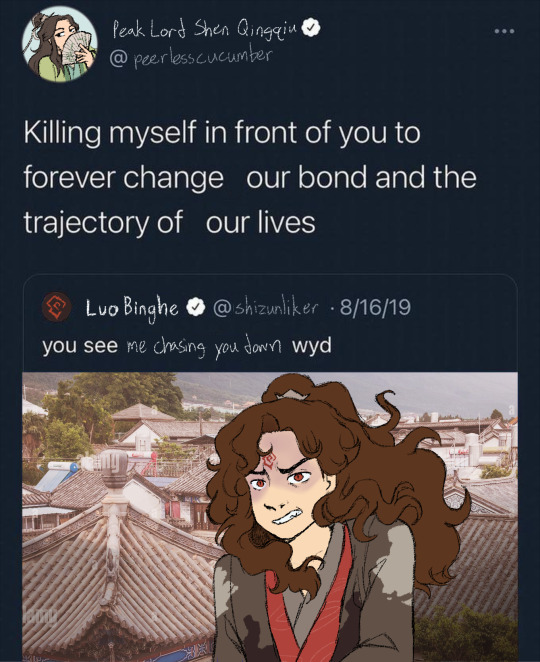
believe it or not i am reading
[ID: A meme redraw of a quote-retweet with Scum Villain characters.
Luo Binghe @/shizunliker: you see me chasing you down wyd (Attached art of Luo Binghe running on Chinese rooftops while scowling)
Peak Lord Shen Qingqiu @/peerlesscucumber: Killing myself in front of you to forever change our bond and the trajectory of our lives. End ID]
#ID by princess-of-purple-prose! thank you :)#i'm like halfway through book 3 of svsss rn#so i'll probably be done reading the main plot and starting on book 4's extras on tuesday#depends#sorry i didn't wanna shade this though. and i used a stock photo bg#anyway#scum villain's self saving system#svsss#luo binghe#shen qingqiu#ren zha fanpai zijiu xitong#had to look at the front of the book to remember the chinese title#my art#fanart
2K notes
·
View notes
Text
Made a silly low-effort thing
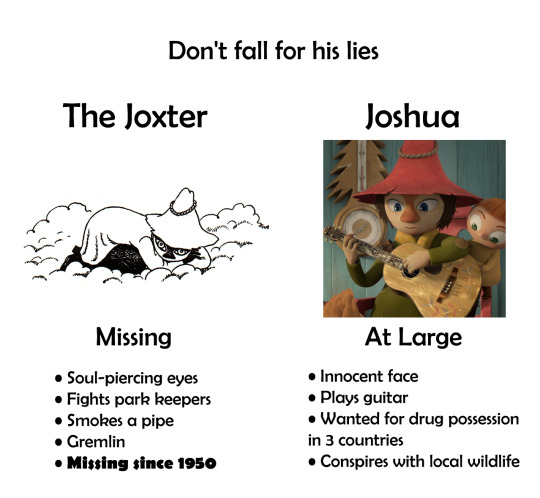
*PLEASE NOTE: I do like Moominvalley (2019)'s Joxter, but I decided to read Moominpappa's Memoirs today and boy howdy are these two different lol.
#my stuff#ask to tag#Moomins#The Moomins#Joxter#The Joxter#Moominvalley season 4 spoilers#Moominvalley#idk how many variants of this meme have gone around but I saw one a while ago and was reminded of it like yesterday or something.#After reading half the book I can see where feral Joxter fanon came from. Dude's a bit of a menace and I'm all for it.#Also he canonically carries a knife with him in the books.#ALSO fun fact: My copy of that book uses “The Exploits of Moominpappa” as the title instead
573 notes
·
View notes
Text
We laugh at sci-fi for how it over-explains technology, but we also need to make fun of how Victorians describe any time period that takes place more than ten years before the book's publishing date.
It's like if we wrote like this about the '80s or '90s.
According to the curious fashions of the day, she wore a shirt of tie-dye print. It may seem quaint to our modern sensibilities, but such colorful styles were a common sight in any public street of those times.
At the time this story occurred, it was not uncommon for young men to wear their hair cropped closely around the face, but allow the hair behind the head to grow until it brushed the level of the shoulders.
In those days, the information superhighway was little more than a crude unpaved path, full of hazards and beset by brigands, so it is not strange that our heroine, instead of entering her query into the search bar on her browser, went to the public library and scoured the books on the shelves for the information she sought.
She and her friends went to the theater to see E.T. How strange to think that film was once at the heights of popularity and acclaim, as well-known in its day as films like The Hunger Games or The Avengers have become in the intervening time.
I get that the lack of video and audio recording made it harder for future generations to experience the details of the past, and that technology was changing their world at a faster rate than ever before, but also, dude, it was only, like, forty years ago, so maybe chill out a bit.
#books#victober#lol#i've noticed this a lot in victorian reading this year#and then last night a chapter of 'a struggle for fame'#involved the author exclaiming over how believe it or not#in the 1850s books like jane eyre were considered the best and most popular things on the market#with a level of acclaim that things like 'the woman in white' or 'lady audley's secret' have since enjoyed#and it really brought the issue to the forefront again and was really funny#also harriet martineau was listed as the other uber-popular author alongside bronte#so maybe i should seek out that title too because it was the only one mentioned i hadn't read yet
425 notes
·
View notes
Text

Excerpt from wip Dead above
#inkprilled#dead above#this is the thing im working on rn im pretty excited about it and i supose thats what writing something u would read does to u#current title is dead above and ive has asks askng for info on any projects and so here is an excerpt#writeblr#wip#writing community#writers on tumblr#writing#spilled writing#writers#book wip#spilled ink#poetry#new writers on tumblr
204 notes
·
View notes
Text
Christians looooooove throwing around the phrase "Jesus was a jew" to dismiss discussions about Christian antisemitism and to defend their appropriation of Jewish practices, but they will do everything in their power to deny what that actually means.
Jesus was a jew but he wasn't circumcised. Jesus was a jew but he didn't keep kosher. Jesus was a jew but he wasn't Jewish.
#antisemitism#christian antisemitism#my christian mom literally reads books with titles like 'jesus was uncut' like???#christianity tw
265 notes
·
View notes
Text
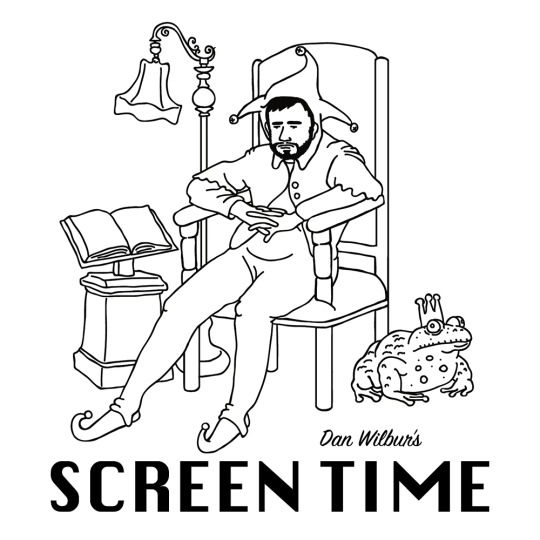
"I’m certain I’m not the only millennial who feels we as a nation have taken a dizzying turn when it comes to drugs. I remember a uniformed police officer showing up once a week in 5th Grade (a year before Sex Ed) to explain how to avoid buying and taking drugs. Luckily, I already knew the dangers of the drug trade because I had seen The Usual Suspects. I knew cocaine was a bad thing to buy, sell, or steal, especially from a drug kingpin. The D.A.R.E. program, however, let me know how important it was to say no to anything fun, including alcohol. At least until I understood a little algebra first. We did role-playing exercises where we walked one by one toward the portly police officer and he casually asked if we wanted to hit a mimed joint with him. All we had to do was say “no” and walk to the other side of the room, defying the only rule I knew about improv. We wrote essays about how important it was to preserve our pristine bodies and minds, obviously unsullied since we had yet to take the class teaching us how puberty was going to defile them both. I’m still mad that my friend Nicole’s essay beat mine in a contest, and she got to read hers in front of the whole school all because she had the benefit of an older brother who took too much acid and sat in her room all night talking about why the existence of light proved God was real. My essay about a time I saw my friend’s dad drink a beer and then drive his truck somewhere was also good! We signed pledges to enter the new millennium drug-free. We took the red pencils that said “Friends Don’t Let Friends Do Drugs” and sharpened all of them down to say “Let Friends Do Drugs,” “Friends Do Drugs,” “Do Drugs,” and simply “Drugs.” Despite that little rebellious act, my friends and I spent a solid six months swearing we’d never put any harmful substance into our bodies besides every form of candy available.
Imagine how I feel now as a D.A.R.E. graduate becoming my dad’s drug dealer. It’s less thrilling than I thought it would be. Between my father’s warning not to hang around one specific neighborhood in Cleveland as a kid and nearly every TV show about drugs, I thought I’d always be buying marijuana from an intimidating dude who definitely had a gun and would use it immediately if he thought I was wearing a wire. Instead, I now buy marijuana from a well-lit storefront that looks like the Apple Store. I’ve even gone to a place where a guy with an iPad explained what each available strain would do to me. I buy what sounds good with all the confidence of a man pointing at items on a menu written in a language he can’t read. I put it all in a cardboard box. I place a book on top. I mail the box to my dad from my local post office. I tell myself the book is to hide the contraband crossing state lines, but in truth, the book is what clears my conscience. I want to send my dad something edifying while also sending him the drug that all of America worried would make me unable to read if I tried it once. The unrequested book is a red herring to distract from the vice, like when you were young and didn’t want to buy condoms outright at the store so you cushioned them between a pack of peanut M&Ms and a magazine. Hmm, what else did I need, — right, while I’m here — might as well pick up a few condoms.
Right as marijuana becomes legal in most states, I’m about done with the drug. I’ve had three good times on edibles, and one of them was when I felt nothing and fell asleep at 9:30 PM. I’m flabbergasted that my dad likes edibles. He seems to be a man free of anxiety. Case in point, I once brought him some THC lozenges to our summer holiday in Chautauqua, and around dinner time I told him “You might want to only take half of what I gave you” to which he replied, “I took it hours ago.” He was stoned and no one noticed.
While I’m stuck in my head, stoned or sober, wondering why I didn’t take some acting gig 15 years ago, wondering if I’ll ever make enough money, worrying I’m doing everything wrong including in this moment as I write this sentence, my dad is enjoying himself.
Judith Grisel, the author of Never Enough: The Neuroscience And Experience of Addiction, describes using marijuana as throwing “a bucket of red paint” on your brain. She was approaching the stimulant clinically in terms of how it differed from the laser focus of other drugs (THC reacts with many receptors in the brain, cocaine focuses on one), but now every time I smoke, I think of the red paint metaphor. While other people seem able to crank an entire joint and do insanely complicated stuff like function at their jobs, I am reduced to a gelatinous blob, on top of which my eyes and brain are navigating a dream state that, like many dreams, isn’t all that interesting the next day. Mostly, I get high and can’t decide what I want to watch on TV or what video game I want to play, I realize how hungry I am, and then I fall asleep with cereal still stuck to my teeth. Pot, for me, is like the squid ink hitting the screen in Mario Kart: I can still see where I’m going, but everything gets a little harder to do, and the panicked half-blindness makes everything slightly more chaotically fun."
Consider subscribing to the Screen Time newsletter.
Other articles include:
An essay on Claire Dederer's book Monsters and movies made by monsters.
Writing inside a Toyota Service Center.
Writing mistresses.
#writing#essay#essays#lit#literary#funny#lol#drugs#books#humor#reading#better book titles#dan wilbur#bibliophile#pot#d.a.r.e#just say no#comedy
755 notes
·
View notes
Text





making a new yearly bullet journal spread is serious business (I drew 72 mini calendar grids and my hand cramped)
#i don’t think i’ve written/drawn to the point of hand cramps since like middle school#it was bc did all the month’s habit trackers (5 per month) now in advance bc I think it makes more sense to get the full picture of all#months at once#and also those mini calendar grids are my least favorite part so now won’t have to bother with those anymore#bookblr#studyblr#booklr#aesthetic#books#study#reading#read#book#bujo#bullet journal#dark academia#january 2024#2024#i also have a page for books but currently it’s just a title so didn’t bother with the pic
629 notes
·
View notes
Text

Coquette Jason while I’m working on my commission sheets and portfolio 🌹💌🩰🕊️✨💋🎀🍒❤️🕯️🩷💀🩸
#he’s reading Jane Austen y’all#I misspelled the books title#it was sense and sensibility#dc#dc jason todd#jason todd fanart#jason robin#jason todd robin#jason todd#jason peter todd#jason wayne#dc redhood#redhood#red hood#red hood fanart#dc comics fanart#dc fanart#dc comics#batfam#batfamily#jaybird#coquette#farmers daughter#lana del rey#fanart#fanartist#dc fanartist#procreate#artists on tumblr#edistormart
530 notes
·
View notes
Text
It's mostly the fault of poor editorial practices that B&R is so heavily misaligned continuity-wise w/ the main batman book. But walk with me for a minute:
You are Damian Wayne. You are 14 years old and have had one of the worst years of your life last year. Which is saying a lot.
Your brother, one of the people you were closest to, got shot in the head and forgot who you were. Your best friend went to space for a week and came back 3/4 years older than you, taking away your previously established dynamic and leaving you to have to bond all over again w/ a new one. You may or may not have gone wayyy too far with your new superhero team, who now all hate you, because you fucked up big time*
And worst of all, when you do try to do the right thing, you end up forced to watch Alfred, a father figure to you, the only one at your birthday that year, the person who has been so patient, loving and trusting with you, even when you probably didnt deserve it...die. you watch him die, and feel it's all your fault.
And your dad never corrects you on that last point. So you run away.
First to your mom who can tell something's up with you, she knows you don't give up that easy, you decide not to stay with her because you remembered how actually, neither of your parents are good at communicating with you despite their best efforts, so now you're 14 and flying solo.
And you do fly solo. For a while. Make new friends, new enemies. You think you're better off for it. You've got your best friend and your brother back. They're not around as much. It's fine.
And eventually your dad tells you that it's not your fault that Alfred died. Bit late but it's appreciated. Really. There's a bit of a hiccup where you get possessed by a demon and wage war against your father but after that, all in all, you two are...together again.
You start to think maybe you want to give him another chance, for the two of you to be father and son.
And in a change of pace, it works out! It's going good, mostly. He insists you go to highschool, you resist, feel like he wants you to be something that you're not (wants you to be normal), but eventually you acquiesce for your own reasons. He cheers you on at soccer and nosies around at your fundraising events with the other parents and gives you a stern talking to about your choice of girlfriend. Because he cares.
Except all the while this is going on, your dad is currently having his brain slowly taken over by an evil version of himself that he created and every time you look away he's slowly tearing your family apart (your brothers are just barely keeping it together. The ones who didn't get lobotmized that is Jesus Christ). You keep taking his side in these conflicts, for whatever reason. Maybe because he promised it would be different this time, and it isn't** and you're going to stick with him until he keeps his word for once.
But at the end of the day?
It's like your brother says. You're not the one who saves him. Broadly speaking, you've made things worse and needed others to come save you. And what else is Robin really for? You thought it was about redemption and teamwork but guess you're wrong. It's about saving your self destructive, apparently two-faced and erratic father. And you can't even do that right.
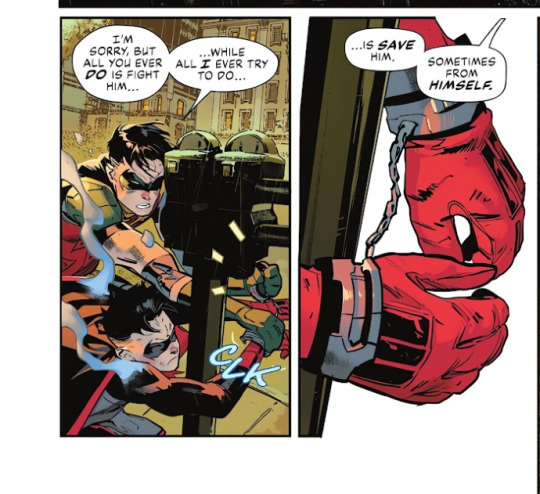
* TT (2016) by Adam Glass is a racist ooc mess, but unfortunately it's still canon so I'm referencing here, though like a lot of works authors clearly wish weren't canon but are, it's been subsequently glossed over. Win? Maybe? Or not?
** again Zdarky's characterization of Damian is so outdated as to be ooc, and considering the way he constantly and explicitly uses it to illustrate Tim's strengths as robin, I'd argue there's. Also implications there. But the batshit insanity of the main batbook compared to B&R rn is crucial for this post, so I'm attempting to justify it. This time..
#ramblings of a lunatic#dc comics#damian wayne#batman and robin#i know i already made an animatic of steph to tears over beers by modern baseball (you know the bit)#but this post has made me think of damian in this context. weeps#idk i read batman 138 for myself and the ways Zdarsky structures it to portray damian as inferior is just. AUGHH IT MAKES ME SICK#LEAVE MY BOY ALONE#the fact that josh williamson (not a perfect writer but i generally enjoy his stuff) had to single handedly save damian-#-after didio left the company and make him robin/a hero again#ONLY FOR THIS STILL TO BE HAPPENING THE MOMENT DAMIAN IS IN A NON JOSH WILLIAMSON BOOK#SICKENING#anyways. imagine if these titles connected and created a greater narrative besides building to event books. would be crazy huh?#that's not fair B&R is enjoyable in its own right and I'd rather have the main batman book touching less things to be frank#but still#if they ever do the theoretical tim/damian robins miniseries that lives in my brain maybe this could be discussed in some way#anyway <3
273 notes
·
View notes
Text

For the winter, or forever
#moomin#moominvalley#snufmin#snufkin#moomins#moomin fanart#my art#moomintroll#artists on tumblr#sketch#drawing#digital art#ibis paint x#doodle#moominvalley fanart#just finished Moominvalley in November hence I've read all Moomin books!! and the hyperfixation is back#it was so good too 🥹 one or my favs for sure#imma get back to watching the series now#muminki#title inspired by a song For The Summer Or Forever by Halftribe which I just love so so much#at first it was just For the winter but it reminded me of it#now i wanna draw something actually summery inspired by the song itself it's so fitting for them...
753 notes
·
View notes
Text

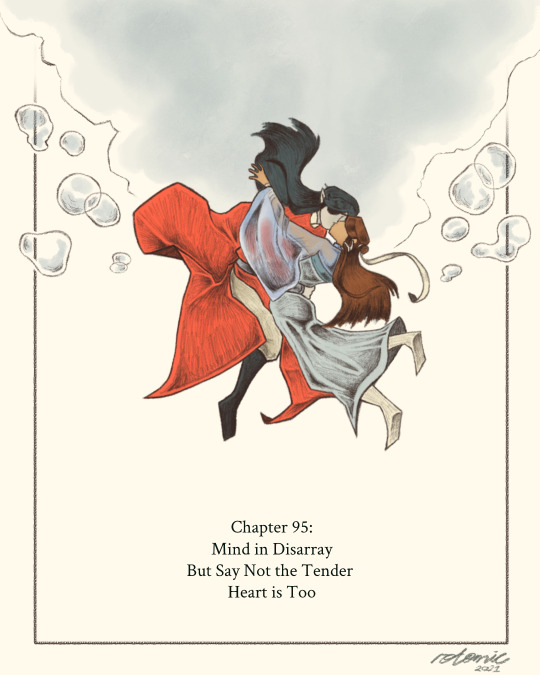

TGCF art from 2021 which were very experimental and very much something out of my comfort zone but am still so satisfied with
(gonna ramble more under the cut 👉 )
My main inspiration for these were definitely classic storybook illustration styles and the watercolor-like illustrations included inside the tgcf books which depict hualian's daily slice of life routines as seen below
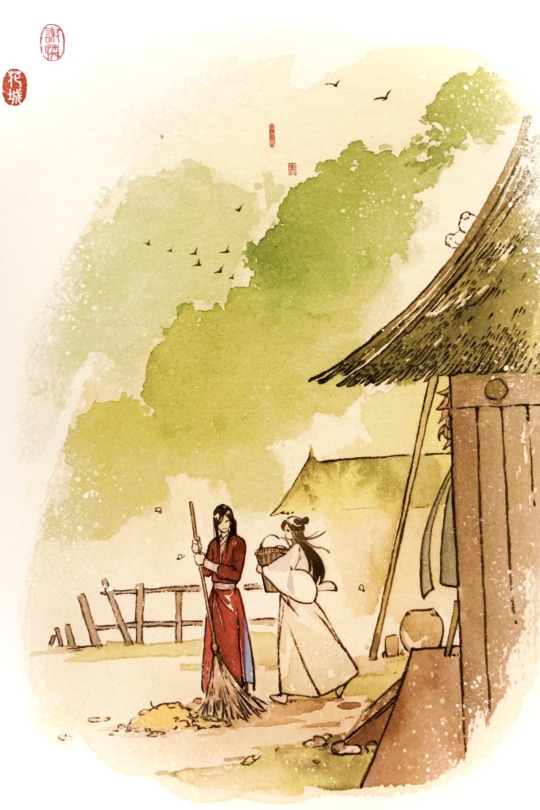

I wanted to capture that feeling of warmth i got from reading but i also went with the storybook look because their relationship (and by extension broad strokes of the entire plot) really did feel like something out of actual myth or legend; i'm chinese indonesian and was raised surrounded by chinese culture + values so tgcf felt VERY familiar to me, it threw me back to my childhood reading or listening to tales about chinese deities, i'd say the storybook image definitely came into my mind pretty quickly bc of this
I find this style somewhat hard to replicate now but if i could or have the time to, i really want to continue the 'companion pieces to chapter titles ' concept i did with the last 2 pieces (which are of the same chapter title but i was just indecisive 😭😭), i even had 3 more planned based on my favorite titles before burning out back then



#rotomic does art#tgcf#tian guan ci fu#heaven official's blessing#hualian#hua cheng#xie lian#mxtx#danmei#IF YOU READ THROUGH ALL OF MY RAMBLING THANK YOU VERY MUCH#as you can see i am Very Normal about this book :)#(said like a liar)#what was 2021 me cooking....like why did they go so hard on these#also bonus hozier in there bc i associate hualian with like real people do a lot#tbh a lot of hozier songs would work for them#i REALLY want to do a companion piece for chapter 243's title bc wowee#it still gets me to this day. i remember it n suddenly im like what the fuck (fond and sad)
1K notes
·
View notes
Text

what I like to call, low budget Soo’s and high budget background, haha.
just a cute scene I thought of, as well as an experiment of different lighting for storytelling
Never got a chance to draw my favorite soos. I haven’t gotten far in part 2 but I’m excited when CJS shows up!
different lighting under cut



#tcf#i love them#cale henituse#art#fanart#my art#choi jung soo#kim rok soo#kim roksu#lee soo hyuk#lighting#i love their friendship#i love these idiots#some of the books have book titles I’ve read or of movies etc while most are just scribbles lol#trash of the count's family#lout of the count’s family
61 notes
·
View notes